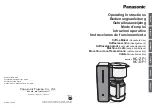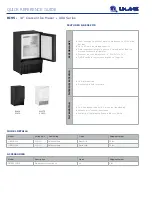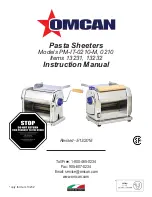
NOTE: The amount of brewed coffee after the brewing process will
always be slightly less than the amount of water placed into the
coffee maker, since some water is absorbed by the coffee ground
and filter. Add a little extra water at the beginning so that you have
the exact number of cups desired.
PUTTING IN THE COFFEE
Swing the filter basket door outward to your right. Lift out removable
filter basket. The provided permanent filter may be used instead of or in
addition to the paper filter. If using paper filters insert a #4 cone-shaped
filter into the filter basket before filling with coffee. Fill the filter with the
required amount of coffee (Fig. 2). After brewing cycle, empty the
grounds and rinse thoroughly with water.
Place the desired amount of ground coffee into the filter. According to
coffee industry standards, use one standard coffee measure (2 level
tablespoons) of grounds for each six ounces of water. After using your
coffee maker several times, the amount of coffee may be adjusted to
suit your particular taste by decreasing or increasing the amount of
coffee used.
NOTE: Be sure to use coffee grounds prepared specifically for
automatic drip coffee makers.
Return the filter basket with the filled filter to the door. Be sure the filter
basket is seated properly in the door. Swing the door closed and snap
into place.
CAUTION: Do not operate your coffee maker if the door does not close
completely. If the door does not close completely, check to see that
the filter basket is properly sealed, and snap door into place.
Press the Power Select Button. The On Light will go on indicating that
the coffee maker has begun the brewing cycle. In a few minutes the
coffee maker will complete the brewing cycle and switch over to the
warming mode which will keep the coffee hot for two hours.
Press the Power Select Button to OFF when the carafe is empty or
when the coffee maker is not in use.
HINTS FOR GREAT TASTING COFFEE
A clean coffee maker is essential for making great tasting coffee.
Regular cleaning, as specified in “Cleaning your Coffee Maker” is highly
recommended.
Always use fresh, cold water in your coffee maker.
Fine grind coffee promotes fuller extraction and provides rich, full-tasting
coffee. Regular grind will require slightly more coffee per cup to provide
the strength of a finer grind.
Store coffee in a cool, dry place. Once coffee has been opened, keep it
tightly sealed in the refrigerator to maintain freshness.
For optimum coffee, buy whole beans and grind them just before
brewing.
Do not re-use coffee grounds since this will greatly impair coffee flavor.
Reheating coffee is not recommended. Coffee is at its peck flavor
immediately after brewing.
Small oil droplets no the surface of brewed black coffee is due to the
extraction of oil from the coffee grounds. Oiliness may occur more
frequently if heavily roasted coffees are used. Over extraction may also
cause oiliness, indicating a need to clean your coffee maker.





























